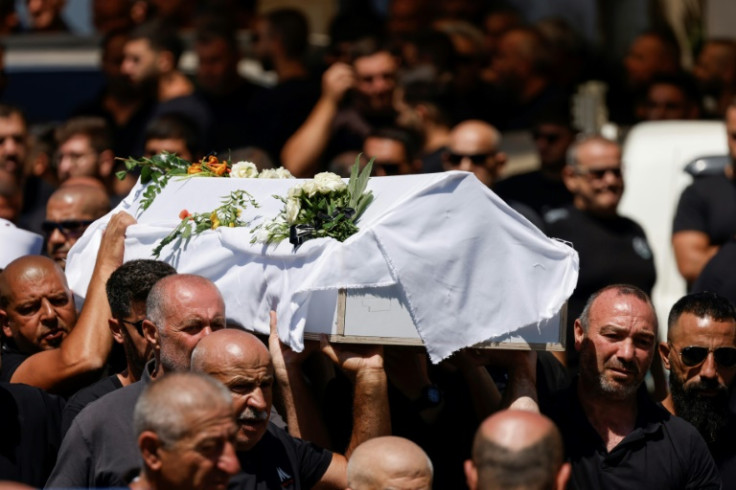Druze In Golan Reject Israeli Threats To Retaliate For Rocket Strike

Druze residents of the Israeli-annexed Golan Heights distanced themselves Tuesday from Israeli threats to retaliate against Lebanon's Hezbollah group for a deadly rocket strike on a Druze Arab town in the territory.
Most of Majdal Shams's around 11,000 residents still identify as Syrian more than half a century after Israel seized the Golan Heights from Syria and later annexed it in a move not recognised by the international community.
On a visit to the town on Monday, Prime Minister Benjamin Netanyahu vowed Israel would deliver a "severe response" to the strike, which killed 12 children aged between 10 and 16 as they played football on Saturday.
On Tuesday, the Israeli army said it had struck around 10 Hezbollah targets overnight and killed one of the Iran-backed group's fighters.
Scores of Majdal Shams residents had come out to protest Netanyahu's visit, many donning traditional Druze caps.
The hawkish prime minister arrived hours after hundreds of mourners had joined the funeral procession for one of the children killed, Guevara Ibrahim, 11.
In a statement issued after his visit, Druze lay and religious leaders said the community rejects the "attempt to exploit the name of Majdal Shams as a political platform at the expense of the blood of our children".
Noting that the Druze faith "forbids killing and revenge in any form", the community leaders said "we reject the shedding of even a single drop of blood under the pretext of avenging our children".
The Israeli military has said that the rocket which hit Majdal Shams was fired by Iran-backed militant group Hezbollah.
Hezbollah, which has traded regular cross-border fire with Israeli forces since the Gaza war began last October, has denied responsibility for the strike, though it claimed multiple attacks on Israeli military positions the same day.
An AFP journalist reported that a semblance of normality had returned to Majdal Shams on Tuesday, with shops open and residents walking on the streets.
But the Druze leaders and residents said the whole community was still reeling from the children's deaths.
"The tragedy is immense, the impact is painful and the loss is shared by every household in the Golan," they said.
A paramedic from Majdal Shams, Nabih Abu Saleh, told AFP: "The town is in a state of mourning that may last for a week.
"We can't look into each other's eyes, because tears will flow," he added.
Saleh said his community was "against any Israeli response", and asked: "Who will we strike? Our people in Syria and Lebanon?"
The Druze, who follow an offshoot of Shiite Islam, are an Arabic-speaking community present in Israel, Lebanon and Syria, including the Golan.
The violence on the Israel-Lebanon border since October has killed 22 soldiers and 24 civilians on the Israeli side, including in the annexed Golan, according to army figures.
At least 527 people have been killed on the Lebanese side, according to an AFP tally. Most have been fighters, but the toll includes at least 104 civilians.

© Copyright AFP 2024. All rights reserved.




















